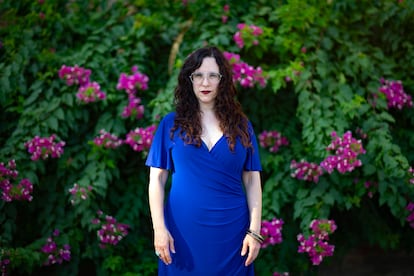Jessica Stern: ‘There’s a very strong, globally networked and wealthy set of actors working around the world and fanning the flames of hatred against LGBTQ+ people’
The former US Special Envoy for the Human Rights of LGBTQI Persons warns about a growing global backlash against gains made over the past years


Jessica Stern, 48, smiles, breathes, reflects, and fires off steely phrases studded with references to equality and human rights. Aware that no victory is permanent, she loads her responses with barbs aimed at the global reactionary right, but without ever losing her infectious laughter. A former U.S. Special Envoy for the Human Rights of LGBTQI Persons under the Joe Biden administration, she attended the UN development aid summit in Seville this week to remind countries of the discrimination and violence suffered by the LGBTQ+ community on a daily basis.
There are still 60 countries around the world with laws criminalizing homosexuality, warns this Harvard University Senior Fellow and former secretary of the United Nations LGBTQI Core Group. Dressed in an electric blue dress, silver-rimmed glasses, and black flip-flops, she steps outside the restaurant to pose for the photographer despite the stifling heat gripping the capital of Spain’s southern region of Andalusia.
Question. How has the current polarization affected the rights of the LGBTQ+ community around the world?
Answer. Discrimination and violence against LGBTQ+ people exist in every country on the planet. However, for many years it felt like we were progressing in pretty significant ways, socially, culturally, politically, legally. But in the past five years, we’ve seen a growing backlash around the world. And I would argue that that backlash is partially due to the success that LGBTQ+ people have had. Unfortunately today, we’re really seeing that backlash come to a head.
Q. Why did this global opposition to all people sharing the same rights arise?
A. There is a very strong, globally networked and wealthy set of actors that are working around the world and fanning the flames of hatred against LGBTQ+ people. They’re extremely well coordinated. You’ll find that there are certain NGOs that go from one country to another. They have a toolkit of anti-LGBTQ+ myths and stereotypes to introduce these ideas. They present bad data, fake news, discredited science to make up these harmful stereotypes about LGBTQ+ people. And they’re partially catching on because in times of crisis, and with so many of our countries being impacted by the climate crisis, by economic instability, by war, by refugees, we want someone to blame. And we want a distraction. And so LGBTQ+ people become the scapegoat.
Q. How are these organizations funded?
A. There’s no region on the planet that’s free from homophobia or transphobia. But what we’ve seen in recent years is the deliberate coordination of these actors that are replicating strategies. So let me give you an example. If you read the proposed anti-LGBTQ+ bill in Ghana, it has all of these concepts and all of these terms that LGBTQ+ people in Ghana don’t use for themselves.
Q. So they copy-paste?
A. The bad ideas come from many places. Russia introduced the so-called anti-propaganda law years ago, equating access to information about LGBTQ+ rights with harming children. And two years ago Florida passed the Don’t Say Gay law, modeled after what came out of Russia.
Q. How many countries today maintain laws that criminalize homosexuality, if a decade ago there were 75?
A. Today there are roughly 60 countries that still criminalize consensual homosexuality. It’s going down, which is the good news. But what’s happened in the past couple of years is we’ve also seen the introduction of sodomy laws in countries that haven’t had them, like Iraq, or expanded existing sodomy laws, like Uganda. But it’s not just homosexual acts or access to gender-affirming care that’s being criminalized right now. We’re seeing this huge push to criminalize activism for LGBTQ+ rights and representation of LGBTQ+ issues in TV and film and news.
Q. What do you think of the Trump administration’s measures?
A. People who are already disempowered, who are already discriminated against, who are already vulnerable, specifically trans people, are being targeted. Trump and his allies are also going after things like non-discrimination laws for LGBTQ+ people. They’re threatening marriage equality in the United States and removing commissioners tasked with preventing discrimination. So what we’re seeing is the highest level of the U.S. government inciting hatred and violence against LGBTQ+ people. And we’re feeling the impact.
Q. Will it get worse?
A. I’m definitely afraid it’s going to get worse. I went to my mailbox a couple days before coming here, and I pulled out a letter that said Jesus will make you pay for your sins. Someone went out of their way to look up my home address, to track me down and to send me a threat. I have a lot of privileges but can you imagine if I’m being targeted like that, how many other LGBTQ+ Americans are at risk?
Q. Was last Saturday’s demonstration in Hungary the exception or the rule in the face of the reactionary wave?
A. President Viktor Orbán has been targeting Hungarian LGBTQ+ people for 15 years, but what happened on Saturday was extraordinary. At Budapest Pride in 2023, 30,000 people showed up. This year, after Pride was banned, 300,000 people showed up, and not just LGBTQ+ people. Everyone came because Orbán is pushing too far. Many people think LGBTQ+ people in Hungary are a canary in the coal mine and they have to turn out to defend them. This is a turning point. I don’t know that Orban realizes it but I think the movement knows it and they will succeed.

Q. Italy is a member of the Equal Rights Coalition despite having a hard right party in power.
A. The situation for the LGBTQ+ community in Italy is very bad; they are depressed and afraid. And there is a good reason for that because they have heard hate speech coming from the highest levels of government and some of them have had their names removed from their children’s birth certificates. Gay and lesbian families in Italy are in danger. And that’s not just a threat to the parents’ rights, it’s actually a threat to the safety of the children. Because if they lose access to their parents, who will protect the children?
On the other hand, the Equal Rights Coalition [led by Spain and Colombia in 2024 and 2025] has a very simple criteria for entrance. It doesn’t require changing laws, it doesn’t require making public statements. So if the bar is so relatively low, does it really matter? The answer is yes. Governments come and go, but very few governments have education for their diplomats, for their public servants, about anything related to LGBTQ+ rights. And through the Equal Rights Coalition, they can actually learn what are the best practices for LGBTQ+ equality.
Q. What was the main achievement of your term?
A. The foundation for my work was trying to prevent discrimination and violence against LGBTQ+ people around the world. The test of the rule of law is not how you treat the most privileged, but how you treat the most vulnerable. My biggest goal was to expand U.S. foreign policy, to bring human rights more into the discourse and to make sure that we were not leaving anyone behind.
Q. What do you say to those who argue that LGBTQ+ rights have moved too fast?
A. One day experiencing discrimination is too many. We don’t have time to wait to end violence against our families, to have equality, walking down the streets with our partners, to make sure our kids are safe going to school. I wish that we lived in a world where LGBTQ+ people and women had a very high standard of equality under the law, but that’s just not the world we live in. So when I hear that argument, I think people are saying, you can wait for your equality, but don’t ask me when.
Q. Is this attack on the LGBTQ+ community a springboard for leaders like Putin or Orbán to eliminate the right of association and political opposition?
A. This is the new strategy of the right. You call something LGBTQ+, you criminalize it, and then you can really attack civil society, freedom of assembly, freedom of speech, freedom of association. They use the LGBTQ+ community to test the waters. It could also be people of African descent, religious minorities and immigrants. It’s the strategy of finding the most vulnerable and scapegoating them. And it is a mistake to think that you can turn a blind eye to it. Because if it can happen to one, it can happen to anyone.
Q. How will the standoff between Trump and Harvard University end?
A. Harvard has become a symbol in the United States for standing up to bullies. There has never been as much support for Harvard as you’ll see right now. People are talking about Harvard in coffee shops. And when you go to demonstrations, people are wearing Harvard University t-shirts. It’s crazy; I don’t know how far it will go. If Trump succeeds in limiting Harvard’s ability to be accredited as a university or to accept foreign students, it will incapacitate the university and prevent it from being able to educate students and produce world-class research. Around 60% of the students that attend the Harvard Kennedy School are international students. They contribute indispensable ideas to the academic community.
Harvard has an obligation to fight back for the principles of academic freedom and for the good of its own students, faculty and administrators. And President Trump doesn’t like being challenged, so I don’t think this battle will end anytime soon. This is in Orbán’s playbook: attack the media, attack the universities, attack the courts. And we know how that turned out in Hungary.
Sign up for our weekly newsletter to get more English-language news coverage from EL PAÍS USA Edition
Tu suscripción se está usando en otro dispositivo
¿Quieres añadir otro usuario a tu suscripción?
Si continúas leyendo en este dispositivo, no se podrá leer en el otro.
FlechaTu suscripción se está usando en otro dispositivo y solo puedes acceder a EL PAÍS desde un dispositivo a la vez.
Si quieres compartir tu cuenta, cambia tu suscripción a la modalidad Premium, así podrás añadir otro usuario. Cada uno accederá con su propia cuenta de email, lo que os permitirá personalizar vuestra experiencia en EL PAÍS.
¿Tienes una suscripción de empresa? Accede aquí para contratar más cuentas.
En el caso de no saber quién está usando tu cuenta, te recomendamos cambiar tu contraseña aquí.
Si decides continuar compartiendo tu cuenta, este mensaje se mostrará en tu dispositivo y en el de la otra persona que está usando tu cuenta de forma indefinida, afectando a tu experiencia de lectura. Puedes consultar aquí los términos y condiciones de la suscripción digital.








































